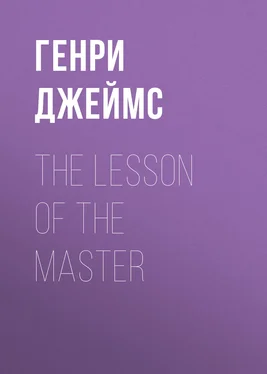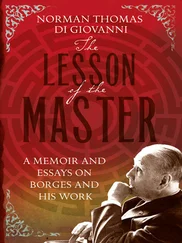Генри Джеймс - The Lesson of the Master
Здесь есть возможность читать онлайн «Генри Джеймс - The Lesson of the Master» — ознакомительный отрывок электронной книги совершенно бесплатно, а после прочтения отрывка купить полную версию. В некоторых случаях можно слушать аудио, скачать через торрент в формате fb2 и присутствует краткое содержание. Жанр: foreign_prose, foreign_antique, на английском языке. Описание произведения, (предисловие) а так же отзывы посетителей доступны на портале библиотеки ЛибКат.
- Название:The Lesson of the Master
- Автор:
- Жанр:
- Год:неизвестен
- ISBN:нет данных
- Рейтинг книги:4 / 5. Голосов: 1
-
Избранное:Добавить в избранное
- Отзывы:
-
Ваша оценка:
- 80
- 1
- 2
- 3
- 4
- 5
The Lesson of the Master: краткое содержание, описание и аннотация
Предлагаем к чтению аннотацию, описание, краткое содержание или предисловие (зависит от того, что написал сам автор книги «The Lesson of the Master»). Если вы не нашли необходимую информацию о книге — напишите в комментариях, мы постараемся отыскать её.
The Lesson of the Master — читать онлайн ознакомительный отрывок
Ниже представлен текст книги, разбитый по страницам. Система сохранения места последней прочитанной страницы, позволяет с удобством читать онлайн бесплатно книгу «The Lesson of the Master», без необходимости каждый раз заново искать на чём Вы остановились. Поставьте закладку, и сможете в любой момент перейти на страницу, на которой закончили чтение.
Интервал:
Закладка:
Overt walked with her into the gallery, and they strolled to the end of it, looking at the pictures, the cabinets, the charming vista, which harmonised with the prospect of the summer afternoon, resembling it by a long brightness, with great divans and old chairs that figured hours of rest. Such a place as that had the added merit of giving those who came into it plenty to talk about. Miss Fancourt sat down with her new acquaintance on a flowered sofa, the cushions of which, very numerous, were tight ancient cubes of many sizes, and presently said: “I’m so glad to have a chance to thank you.”
“To thank me—?” He had to wonder.
“I liked your book so much. I think it splendid.”
She sat there smiling at him, and he never asked himself which book she meant; for after all he had written three or four. That seemed a vulgar detail, and he wasn’t even gratified by the idea of the pleasure she told him—her handsome bright face told him—he had given her. The feeling she appealed to, or at any rate the feeling she excited, was something larger, something that had little to do with any quickened pulsation of his own vanity. It was responsive admiration of the life she embodied, the young purity and richness of which appeared to imply that real success was to resemble that , to live, to bloom, to present the perfection of a fine type, not to have hammered out headachy fancies with a bent back at an ink-stained table. While her grey eyes rested on him—there was a wideish space between these, and the division of her rich-coloured hair, so thick that it ventured to be smooth, made a free arch above them—he was almost ashamed of that exercise of the pen which it was her present inclination to commend. He was conscious he should have liked better to please her in some other way. The lines of her face were those of a woman grown, but the child lingered on in her complexion and in the sweetness of her mouth. Above all she was natural—that was indubitable now; more natural than he had supposed at first, perhaps on account of her æsthetic toggery, which was conventionally unconventional, suggesting what he might have called a tortuous spontaneity. He had feared that sort of thing in other cases, and his fears had been justified; for, though he was an artist to the essence, the modern reactionary nymph, with the brambles of the woodland caught in her folds and a look as if the satyrs had toyed with her hair, made him shrink not as a man of starch and patent leather, but as a man potentially himself a poet or even a faun. The girl was really more candid than her costume, and the best proof of it was her supposing her liberal character suited by any uniform. This was a fallacy, since if she was draped as a pessimist he was sure she liked the taste of life. He thanked her for her appreciation—aware at the same time that he didn’t appear to thank her enough and that she might think him ungracious. He was afraid she would ask him to explain something he had written, and he always winced at that—perhaps too timidly—for to his own ear the explanation of a work of art sounded fatuous. But he liked her so much as to feel a confidence that in the long run he should be able to show her he wasn’t rudely evasive. Moreover she surely wasn’t quick to take offence, wasn’t irritable; she could be trusted to wait. So when he said to her, “Ah don’t talk of anything I’ve done, don’t talk of it here ; there’s another man in the house who’s the actuality!”—when he uttered this short sincere protest it was with the sense that she would see in the words neither mock humility nor the impatience of a successful man bored with praise.
“You mean Mr. St. George—isn’t he delightful?”
Paul Overt met her eyes, which had a cool morning-light that would have half-broken his heart if he hadn’t been so young. “Alas I don’t know him. I only admire him at a distance.”
“Oh you must know him—he wants so to talk to you,” returned Miss Fancourt, who evidently had the habit of saying the things that, by her quick calculation, would give people pleasure. Paul saw how she would always calculate on everything’s being simple between others.
“I shouldn’t have supposed he knew anything about me,” he professed.
“He does then—everything. And if he didn’t I should be able to tell him.”
“To tell him everything?” our friend smiled.
“You talk just like the people in your book!” she answered.
“Then they must all talk alike.”
She thought a moment, not a bit disconcerted. “Well, it must be so difficult. Mr. St. George tells me it is —terribly. I’ve tried too—and I find it so. I’ve tried to write a novel.”
“Mr. St. George oughtn’t to discourage you,” Paul went so far as to say.
“You do much more—when you wear that expression.”
“Well, after all, why try to be an artist?” the young man pursued. “It’s so poor—so poor!”
“I don’t know what you mean,” said Miss Fancourt, who looked grave.
“I mean as compared with being a person of action—as living your works.”
“But what’s art but an intense life—if it be real?” she asked. “I think it’s the only one—everything else is so clumsy!” Her companion laughed, and she brought out with her charming serenity what next struck her. “It’s so interesting to meet so many celebrated people.”
“So I should think—but surely it isn’t new to you.”
“Why I’ve never seen any one—any one: living always in Asia.”
The way she talked of Asia somehow enchanted him. “But doesn’t that continent swarm with great figures? Haven’t you administered provinces in India and had captive rajahs and tributary princes chained to your car?”
It was as if she didn’t care even should he amuse himself at her cost. “I was with my father, after I left school to go out there. It was delightful being with him—we’re alone together in the world, he and I—but there was none of the society I like best. One never heard of a picture—never of a book, except bad ones.”
“Never of a picture? Why, wasn’t all life a picture?”
She looked over the delightful place where they sat. “Nothing to compare to this. I adore England!” she cried.
It fairly stirred in him the sacred chord. “Ah of course I don’t deny that we must do something with her, poor old dear, yet.”
“She hasn’t been touched, really,” said the girl.
“Did Mr. St. George say that?”
There was a small and, as he felt, harmless spark of irony in his question; which, however, she answered very simply, not noticing the insinuation. “Yes, he says England hasn’t been touched—not considering all there is,” she went on eagerly. “He’s so interesting about our country. To listen to him makes one want so to do something.”
“It would make me want to,” said Paul Overt, feeling strongly, on the instant, the suggestion of what she said and that of the emotion with which she said it, and well aware of what an incentive, on St. George’s lips, such a speech might be.
“Oh you—as if you hadn’t! I should like so to hear you talk together,” she added ardently.
“That’s very genial of you; but he’d have it all his own way. I’m prostrate before him.”
She had an air of earnestness. “Do you think then he’s so perfect?”
“Far from it. Some of his later books seem to me of a queerness—!”
“Yes, yes—he knows that.”
Paul Overt stared. “That they seem to me of a queerness—!”
“Well yes, or at any rate that they’re not what they should be. He told me he didn’t esteem them. He has told me such wonderful things—he’s so interesting.”
There was a certain shock for Paul Overt in the knowledge that the fine genius they were talking of had been reduced to so explicit a confession and had made it, in his misery, to the first comer; for though Miss Fancourt was charming what was she after all but an immature girl encountered at a country-house? Yet precisely this was part of the sentiment he himself had just expressed: he would make way completely for the poor peccable great man not because he didn’t read him clear, but altogether because he did. His consideration was half composed of tenderness for superficialities which he was sure their perpetrator judged privately, judged more ferociously than any one, and which represented some tragic intellectual secret. He would have his reasons for his psychology à fleur de peau, and these reasons could only be cruel ones, such as would make him dearer to those who already were fond of him. “You excite my envy. I have my reserves, I discriminate—but I love him,” Paul said in a moment. “And seeing him for the first time this way is a great event for me.”
Читать дальшеИнтервал:
Закладка:
Похожие книги на «The Lesson of the Master»
Представляем Вашему вниманию похожие книги на «The Lesson of the Master» списком для выбора. Мы отобрали схожую по названию и смыслу литературу в надежде предоставить читателям больше вариантов отыскать новые, интересные, ещё непрочитанные произведения.
Обсуждение, отзывы о книге «The Lesson of the Master» и просто собственные мнения читателей. Оставьте ваши комментарии, напишите, что Вы думаете о произведении, его смысле или главных героях. Укажите что конкретно понравилось, а что нет, и почему Вы так считаете.












